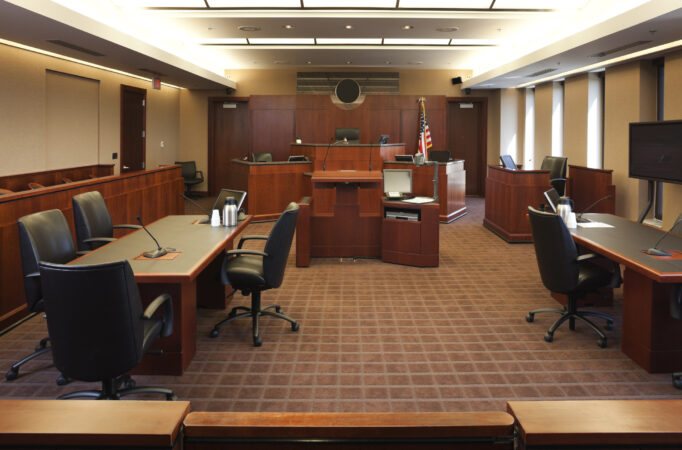Litigation
District Court Holds that Compulsory Counterclaim is Subject to Forum Selection Provision in Stock Purchase Agreement
In an interesting procedural decision, the U.S. District Court for the Western District of Pennsylvania has held that a forum selection provision in a stock purchase agreement bars the assertion of a compulsory amended counterclaim. The case, Excentus Corp. v. Giant Eagle, Inc., No. 13-178, 2013 U.S. Dist. LEXIS 168221 (W.D. Pa. Nov. 26, 2013), involved a dispute between a corporation and one of its shareholders. In the suit, the shareholder sought to assert an amended counterclaim for a declaratory judgment with respect to the corporation’s repurchase rights under two shareholder purchase agreements. Those agreements both contained forum selection provisions that stated:
VENUE FOR ANY ACTION ARISING OUT OF THIS AGREEMENT SHALL RESIDE EXCLUSIVELY IN THE COUNTY IN WHICH THE RESPONDENT’S PRINCIPAL OFFICES ARE LOCATED.
The corporation argued that, under the forum selection provisions, the shareholder’s proposed amended counterclaim was futile because the corporation’s principal offices are located outside of the state. In an effort to avoid the import of the forum selection provisions, however, the shareholder countered that the counterclaim was compulsory and therefore not subject to the provisions. The court resolved the issue in favor of the corporation, even assuming that the proposed counterclaim was compulsory.
Relying on case law from other jurisdictions, the court concluded as a threshold matter that the compulsory nature of a counterclaim should have no bearing on the enforceability of a forum selection provision. Simply put, if the parties bargain for a forum selection provision in their contract, Rule 13(a) does not override that bargain. In so concluding, the court recognized the inherent tension in requiring the counterclaim to be litigated separately in another forum. It also considered another recent case from the Western District of Pennsylvania that reached the opposite conclusion. Neither was persuasive or controlling in the view of the court, however. Instead, the court determined that the weight of the authority and modern trend was to enforce the forum selection provisions. The corporation, however, would be prohibited from arguing that the shareholder is precluded from asserting the claim in the designated forum in the event that the shareholder were to elect to refile the claim.
In addition, the court also rejected the shareholder’s argument that the forum selection provisions only required that the initial action be filed in the designated forum-i.e., the court disagreed that the shareholder’s proposed counterclaim was not “any action” within the meaning of the provisions. According to the court, the phrase “any action,” when unqualified, should be afforded a broad definition that encompasses counterclaims such as the one that the shareholder was attempting to assert. Consequently, the court refused to allow the shareholder to amend its counterclaim.
As a comment, practitioners reading this analysis might be wondering why the court did not decline to enforce the forum selection provisions on waiver grounds, particularly since the shareholder had already asserted a counterclaim against the corporation without objection. The court addressed this argument in a footnote, stating that it agreed with the corporation that the non-waiver provision in the shareholder purchase agreements allowed it to raise the forum selection provisions in response to the proposed amended counterclaim without regard to whether it had invoked the provisions earlier. Thus, at least in the case of contracts containing non-waiver provisions, it is not a foregone conclusion that a party’s initial decision not to invoke a forum selection provision will result in a subsequent waiver.
Finally, practitioners also might be wondering why the court did not consider the effect of the corporation’s filing of the original complaint in the U.S. District Court for the Western District of Pennsylvania in considering the waiver argument. There is no clear answer to this question. However, it would seem to have to do with the language of the forum selection provisions, which required that suit be filed where the “respondent” to the suit has its principal offices. In other words, the forum selection provisions were drafted in a way such that the party bringing suit had to sue the other party to the agreements in that party’s home forum. As such, the corporation did not waive the provisions by filing the complaint in Pennsylvania. To the contrary, that result was required by the forum selection provisions in the agreements and therefore could not amount to a waiver of the provisions for purposes of allowing the counterclaims to go forward if objected to. (AUTHOR’S NOTE: As additional support for this conclusion, the action was originally filed in the U.S District Court for the Northern District of Texas, but was dismissed after the shareholder successfully argued that the forum selection provisions in the agreements required that the action be filed in Allegheny County. See Excentus Corp. v. Giant Eagle, Inc., No. 3:11-CV-3331-B, 2012 U.S. Dist. LEXIS 91250 at * 7 (N.D. Tex. July 2, 2012) (“Giant Eagle is located in Allegheny County, Pennsylvania, and Giant Eagle argues that, given its reliance on the Stock Purchase Agreements as a defense to Excentus’ claims, these claims must be brought in Allegheny County.”)).
About Us
The litigation attorneys at Houston Harbaugh, P.C., are accomplished business trial lawyers, providing comprehensive support in litigation across a broad spectrum of matters throughout Pennsylvania, West Virginia, Ohio and other jurisdictions upon a special admission basis. Our clients are regional and national small, medium and large companies and individuals who seek well planned and aggressive, but cost effective litigation. We counsel, we budget, we have a deep bench, we act quickly when needed and we have experienced trial lawyers who know the courts and bench. We serve regularly as local counsel for some of the largest law firms in the country when they have matters in this region.

Henry M. Sneath - Practice Chair
Co-Chair of Houston Harbaugh’s Litigation Practice, and Chair of its Intellectual Property Practice, Henry Sneath is a trial attorney, mediator, arbitrator and Federal Court Approved Mediation Neutral and Special Master with extensive federal and state court trial experience in cases involving commercial disputes, breach of contract litigation, intellectual property matters, patent, trademark and copyright infringement, trade secret misappropriation, DTSA claims, cyber security and data breach prevention, mitigation and litigation, probate trusts and estates litigation, construction claims, eminent domain, professional negligence lawsuits, pharmaceutical, products liability and catastrophic injury litigation, insurance coverage, and insurance bad faith claims.

Samuel H. Simon - Practice Chair
As co-chair of Houston Harbaugh’s Litigation Group, Sam focuses his practice on commercial/business litigation. Sam regularly represents clients in the construction, manufacturing, oil and gas, and wholesale/retail/ distribution industries, as well as individuals in matters such as:
- Construction litigation
- Environmental litigation
- Breach of contract disputes
- Oil and gas litigation
- Negligence
- Restrictive covenants (non-compete agreements)
- Civil rights
- Collections/creditors’ rights
- Lease disputes

